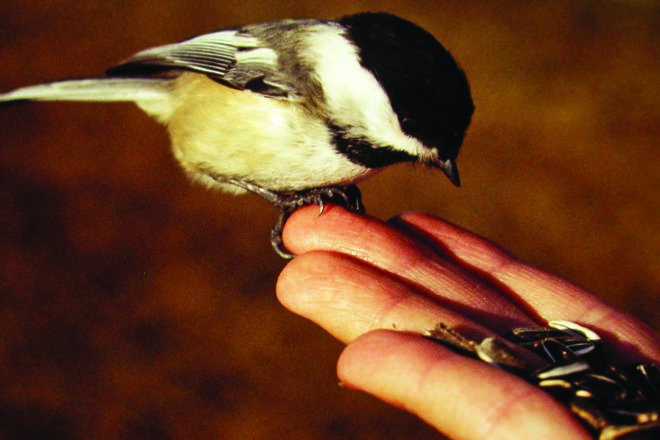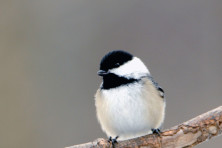Door To Nature: Chickadee Memories
- Share
- Tweet
- Pin
- Share

The feeders were so quiet for much of the winter. There have been a couple dozen pine siskins high up in the trees communicating their wishes for more hulled sunflower seeds to be scattered on the platforms, but few other birds are very vocal.
Then, on an unusually warm sunny day last week, I heard two black-capped chickadees singing to each other. Their two-toned song, a higher-pitched “dee,” followed by two lower-pitched “dee-dees,” told me that their mood is changing. Their courtship season is beginning.
Many species of birds have a call and a song, with each meaning very different things, like an alert to danger, or a stakeout of territory. The call of a chickadee is heard more, and it sounds like, “chip-a-dee-dee-dee.” That call is how it got its name; its song is more flowing and musical.
Some people think the song of a chickadee is actually that of an eastern phoebe. Phoebes migrate south each autumn and may return to our area in the next few weeks. We have heard and seen them as early as mid-March in some years. The sound of a vocalizing phoebe is much buzzier, and not the clear musical tones of the chickadee’s song.
One of my most memorable experiences was at Toft Point on New Year’s Day, 1972. That was the day Roy asked me to marry him. The snow was quite deep as we snowshoed the long road to Mud Bay. There was a spot about halfway out where several flat-topped rocks were near the road. Roy told me that was where Miss Emma would put leftover food scraps for the creatures of the forest to eat.
He asked me to take off one mitten and then he put a small bunch of sunflower seeds in my palm. It was completely quiet as he began to whistle the chickadee song. Over and over he called, and finally I heard the whoosh of a bird’s wings behind me. There was a chickadee that landed on Roy’s hat and then came down to my hand and took a seed. Then another chickadee got a seed while one sat up in the tree scolding, as if to say, “Be careful! These humans are dangerous!” It was so thrilling to have a wild bird eat from my bare hand.
There’s been a hawk catching birds in my front yard off and on during the past two years. I know when it is in the nearby woods because none of the larger birds or any woodpeckers come in to get food. However, the chickadee seems brave enough to land on the platform and snatch a seed and then fly off.
These small creatures are so maneuverable and quick that they make it very hard for a hawk to catch them. Stroboscopic studies of this speed merchant showed that it could change direction of flight in three hundredths of a second. Its wingbeat of about 30 per second gives them their great ability to change course almost instantly.
Yellow-bellied sapsuckers live in my woods and should be returning soon. They can often be seen “tapping” a sugar maple tree for some sap as a springtime treat. I remember seeing a paper birch tree trunk that had been riddled with holes by a sapsucker. Soon a chickadee came and inspected many of the holes finding tiny insects that were attracted to these openings.
Chickadees are very knowledgeable about their environment and will often visit a tree where woodpeckers have made holes or chipped away some bark, looking for insects, spider eggs and other tasty morsels.
One of my nicest memories was finding a beautiful chickadee nest in a bluebird box along our trail in August one year. That was rather late to begin a nest. Roy photographed it in the box that had a side panel which we could lift up for easy cleaning. A chickadee nest is built with an inch-deep layer of fresh green moss.
It’s hard to imagine how much work it took this tiny bird to pick each moss piece and pack it into the box. Then some thin grass blades are added and finally there is a circle of fine animal hair, maybe from a rabbit or other small mammal. The nest had seven eggs in it. Four of them hatched and fledged.
Harold Wilson, of Ephraim, was a longtime bird bander and a good friend of Roy’s. He enjoyed reciting “The Toast to the Chickadee”:
Here’s to the chickadee! /The sexes are alike, you see. /It’s hard to tell the he from she. /But she can tell, and so can he!

